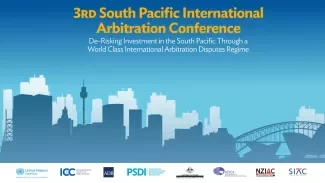The Economic Impact of International Commercial Arbitration
Prof. Dr. Jordi Paniagua, professor of economics at the University of Valencia, highlighted the positive economic impacts of international commercial arbitration. He first showed graphs illustrating the trends in foreign direct investment (FDI) worldwide and in the South Pacific in terms of capital expenditures, jobs created and projects started from 2003 to 2020. He also emphasized the one-third loss in FDI measured in terms of all three factors in 2020 and explained the loss as a consequence of the coronavirus disease (COVID-19) pandemic.
Prof. Dr. Paniagua suggested that international arbitration can function as an economic vaccine to help countries recover from the devastating economic impacts of COVID-19. First, promoting arbitration by ratifying the New York Convention increases FDI bilateral flows by 77% and international trade with convention members by as much as 30%. Second, adopting the United Nations Commission on International Trade Law Model Law on International Commercial Arbitration has also increased FDI flows by 67% and trade flows by 7% on the average. Third, arbitration produces three kinds of general welfare effects: increased gross domestic product, lower consumer prices and higher producer prices. Based on statistics, arbitration has increased gross domestic product by approximately 13% globally, 15% for New York Convention members, 8% for Organization for Economic Co-operation and Development members, and 11% for South Pacific countries. On this note, he emphasized that simply by joining the New York Convention, South Pacific countries are sending the signal that they are open for business. Consumers benefit by paying less for products and services due to the positive trade-induced effects of arbitration mechanisms. Consumers in countries that have joined the New York Convention felt the most reduction in consumer prices (at about 9%). Lastly, producers also enjoy higher prices for their goods and services. Similarly, producers in countries that have ratified the New York Convention enjoyed the highest price increases (at approximately 8%).
He then explained the gravity equation by exploring how the geographical distance between Australia and other countries impacts trading activity. The countries that are able to overcome the negative impact of their distance from Australia are (i) those with bigger economies, such as the People’s Republic of China and the United States (US); (ii) those that share the same common law system, such as Brunei, India and Singapore; and (iii) those that have the same dispute resolution system, i.e. arbitration. Simply put, FDI and trade favor states with more economic activity and less friction. Frictions between trading partners can be natural, such as differences in history, culture and language, or human-made, such as differences in contractual and institutional environment.
He described international commercial arbitration as an effective and predictable dispute settlement mechanism. First, it is flexible, confidential and final. Second, it increases the trust between parties. Finally, it reduces the uncertainty of litigation in domestic courts.
To end, Dr. Paniagua suggested that countries can promote international business in four ways. They can (i) get closer to desired markets through a shared language or history, (ii) grow bigger by exploiting comparative advantages and seeking economic growth, (iii) be smarter by providing a better contractual environment through arbitration, and (iv) be healthy and safe by dealing effectively with the COVID-19 pandemic.
